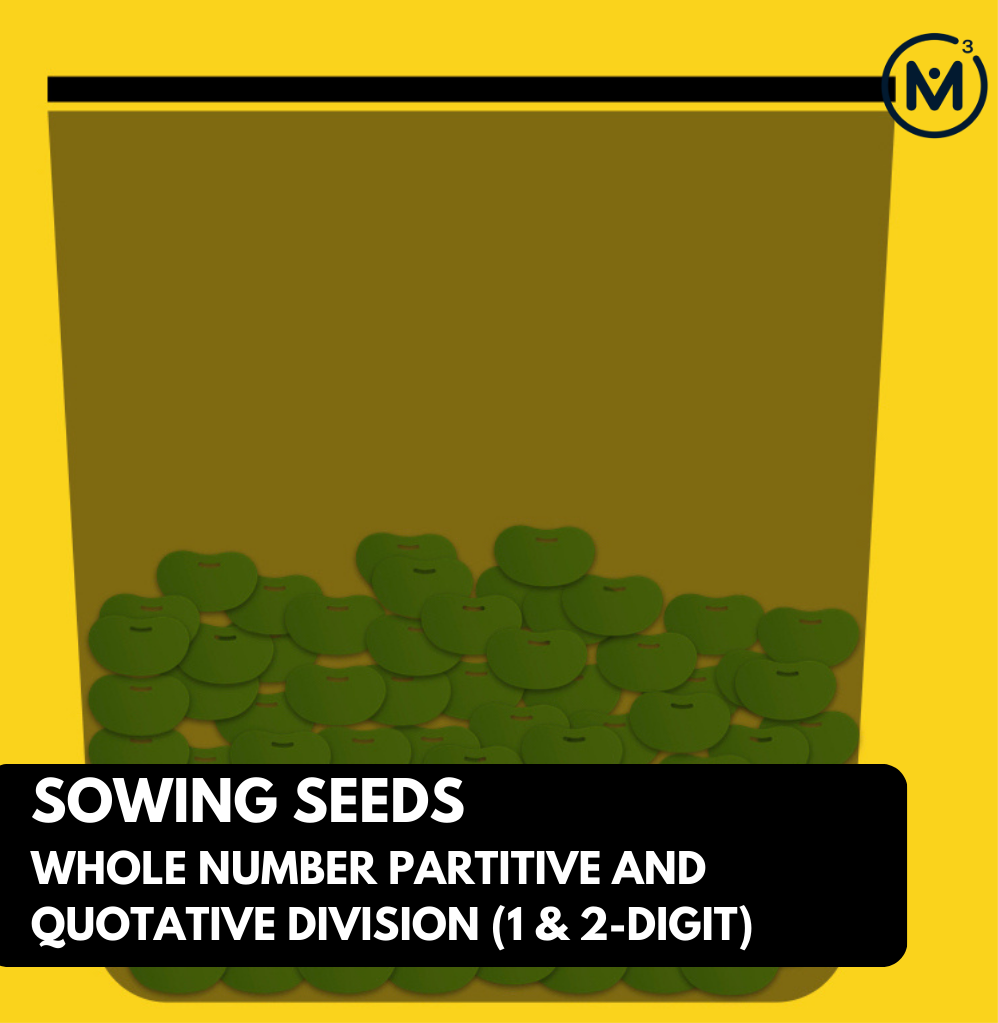SOWING SEEDS [DAY 4]
Whole Number Partitive and Quotative Division (1 & 2-Digit)
Introduction to partitive and quotative division. This unit is designed to support students in understanding the two types of division and should be considered before exploring all other division units.
Intentionality
Math Talk
Purposeful Practice
Resources & Downloads
Educator Discussion Area
Intentionality & Unit Overview

Length of Unit: 5 Days
Access each lesson from this unit using the navigation links below
Students will explore modelling partitive division of two-digit whole numbers by one and two-digit divisors.
Intentionality…
The purpose of the Day 4 activities is to reinforce key concepts from Day 1. Students will engage in a string of related problems through a math talk and will have an opportunity to complete independent purposeful practice.
The math talk and purposeful practice serve to develop a deeper understanding of the following big ideas:
- There are two types of division;
- Partitive division is when the total quota is known (the dividend), and the number of parts or groups (the divisor) is known;
- Partitive division reveals a rate;
- In partitive division, the dividend and the divisor often have different units;
- In a quotative context, the dividend and the divisor have the same unit;
- Quotative division is when the total quota is known (the dividend), and the number per group or the rate (the divisor) is known;
- Quotative division reveals the number of copies or iterations of a rate that can be derived from the overall quota (the dividend);
- The dividend and the divisor of any division sentence represent a ratio;
- In a partitive context, the ratio is often a composed unit;
- In a quotative context, the ratio is a multiplicative comparison;
- The dividend from any division sentence can be decomposed into smaller parts to allow for friendlier division by the divisor. This strategy is known as partial quotients. (i.e.: 85 ÷ 5 = 45 ÷ 5 + 40 ÷ 5 = 9 + 8 = 17).
- The remainder can be divided by the dividend resulting in a fraction in both partitive and quotative division contexts, unless the unit is discrete and cannot be partitioned (for example, a marble or a person).
Math Talk
Login/Join to access the entire Teacher Guide, downloadable slide decks and printable handouts for this lesson and all problem based units.
Purposeful Practice
While Students Are Practicing…
Login/Join to access the entire Teacher Guide, downloadable slide decks and printable handouts for this lesson and all problem based units.
Questions: Partitive and Quotative Division
Question #1:
Login/Join to access the entire Teacher Guide, downloadable slide decks and printable handouts for this lesson and all problem based units.
Question #2:
Login/Join to access the entire Teacher Guide, downloadable slide decks and printable handouts for this lesson and all problem based units.
Question #3:
Login/Join to access the entire Teacher Guide, downloadable slide decks and printable handouts for this lesson and all problem based units.
Question #4:
Login/Join to access the entire Teacher Guide, downloadable slide decks and printable handouts for this lesson and all problem based units.
We suggest collecting this reflection as an additional opportunity to engage in the formative assessment process to inform next steps for individual students as well as how the whole class will proceed.
Resources & Downloads
Login/Join to access the entire Teacher Guide, downloadable slide decks and printable handouts for this lesson and all problem based units. Or purchase the entire unit.
Educator Discussion Area
Login/Join to access the entire Teacher Guide, downloadable slide decks and printable handouts for this lesson and all problem based units.
Explore Our 60+ Problem Based Units
This Make Math Moments Lesson was designed to spark curiosity for a multi-day unit of study with built in purposeful practice, number talks and extensions to elicit and emerge strategies and mathematical models.
Dig into our other units of study and view by concept continuum, grade or topic!




